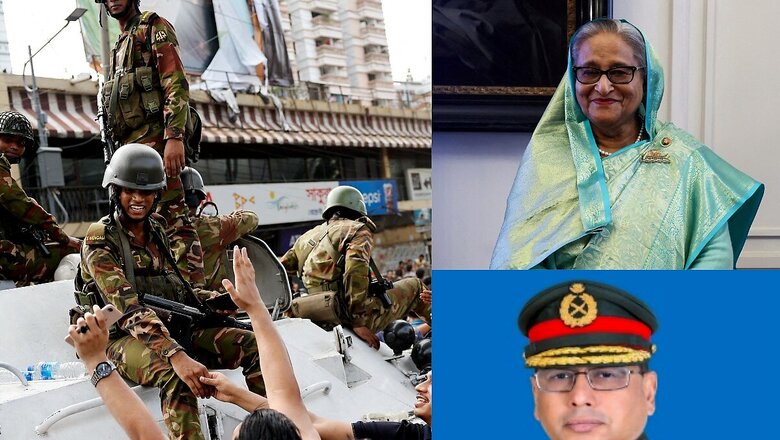
views
Indian government officials reportedly warned former Bangladesh Prime Minister Sheikh Hasina about the potential risks linked with appointing General Waker-Uz-Zaman as Army Chief in June last year.
Despite these cautions, Hasina went ahead with the appointment, a decision that many believe played a key role in her recent ousting. Instead of addressing the escalating youth protests, Gen Zaman issued an ultimatum to Sheikh Hasina, demanding that she and her sister flee the country.
The Army’s swift decision to release opposition BNP leader Khaleda Zia serves as an indication that Islamist groups such as Jamaat-e-Islami and Islami Chhatrashibir are likely to become prominent players in the country’s politics, according to The Hindustan Times.
READ MORE: Bangladesh Unrest LIVE: Jaishankar Says Situation Not That Bad To Need Evacuation, Rahul Gandhi Raises Foreign Conspiracy Concerns

On Tuesday, Sheikh Hasina resigned from her position after weeks of violent demonstrations that left over 300 dead. The protests, initially sparked by opposition to a government job quota system, evolved into widespread calls for her resignation. As protesters stormed her official residence in Dhaka, Hasina was evacuated by military helicopter to India, where she arrived at Hindon Air Base before potentially heading to London.
General Waker-Uz-Zaman, who took command of the army just weeks before the protests intensified, announced in a televised address that he was assuming responsibility for the country’s governance and would oversee the formation of an interim government. He emphasised the military’s commitment to restoring order and called for calm among the populace.
URGENTE – CRISIS EN BANGLADESHEl jefe del ejército de Bangladesh, general Waker-Uz-Zaman, se dirigió a la nación y confirmó que la primera ministra Sheikh Hasina ha dimitido y que un gobierno interino gobernará el país.pic.twitter.com/NxvRHSvDEn
— Alerta News 24 (@AlertaNews24) August 5, 2024
The violent unrest in India’s neighbourhood has raised significant concerns in New Delhi. The Indian government has placed its border with Bangladesh on high alert and is monitoring the situation closely. National Security Advisor Ajit Doval met with Hasina upon her arrival in India to discuss the implications of her departure and the evolving crisis.
Regional analysts suggest that Hasina’s resignation marks a critical turning point for Bangladesh, leaving a power vacuum that could lead to further instability. The military’s involvement in politics, combined with the rise of radical groups, poses a significant challenge for the interim government. The situation remains fluid, with uncertainty about the future political landscape in Bangladesh.
Catch the latest developments on Bangladesh Unrest with our live blog.
















Comments
0 comment